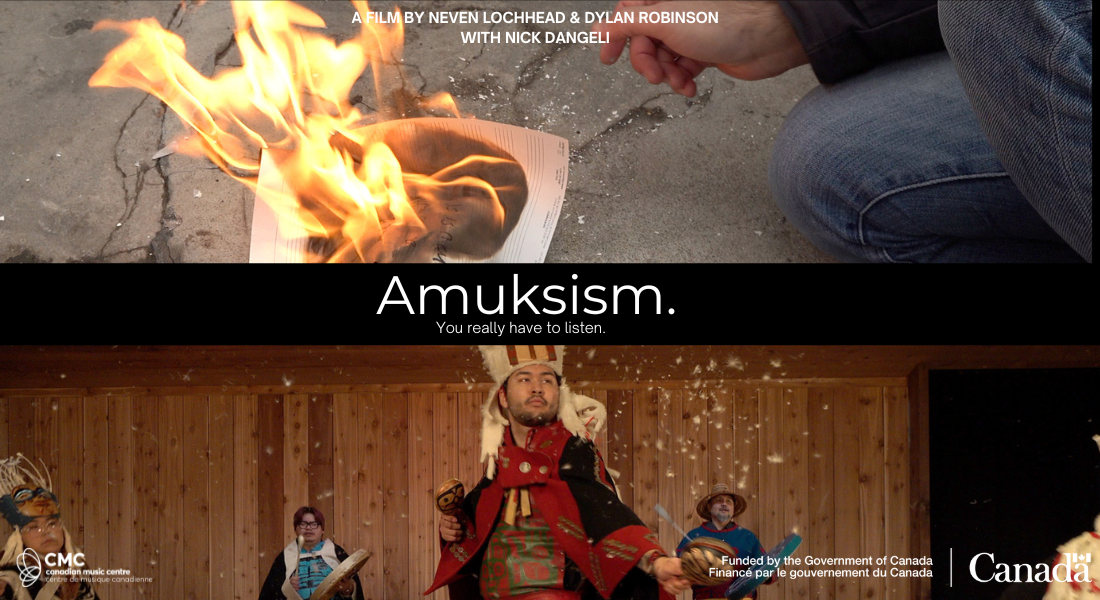Synopsis
In 2017, as part of Canada’s year-long celebrations of the sesquicentennial of confederation, the Canadian Opera Company decided to remount the opera “Louis Riel” by composer Harry Somers and librettist Mavor Moore, one of the few Canadian Grand Operas. However, contained within the work, was an arrangement and deconstruction of a Nisga’a Limx ooy song belonging to the House of Sgat’iin, which Somers wrote as an aria for the character of Marguerite Riel to sing to her child.
The Limx ooy was collected by ethnographer Marius Barbeau and transcribed by composer Ernest MacMillan as part of an expedition to the west coast in the 1920s in the context of the Potlach Ban.
During the rehearsals for the Opera, Dr. Dylan Robinson (Stó:lō/Skwah) and members of the Nisga’a Nation (Keane Tait, Michael Dangeli) approached the COC to engage the company in dialogue about how this use represented an infraction of the Nisga’a Lisims’ protocol and law.
In this documentary, Indigenous composers, musicians, artists and scholars, as well as representatives from the COC and CMC discuss what’s at stake when settler artists misappropriate and misuse indigenous song and ceremony and how to broach a move towards reparation and redress.
After Watching
We invite you to share your thoughts after watching Amuksism. You really have to listen. by filling out this form. Your feedback helps us continue these vital discussions.
Fill out feedback form
A statement from the Canadian Music Centre
The Canadian Music Centre (CMC) acknowledges the historical and ongoing harm caused by the misappropriation and misuse of Indigenous song and ceremony in settler music traditions. Amuksism. You really have to listen. sheds light on the ways in which colonial practices have shaped the Canadian music landscape and the urgent need to engage in meaningful dialogue and action toward reconciliation.
The CMC is committed to fostering ethical and respectful relationships with Indigenous artists, knowledge keepers, and communities. We recognize the importance of Indigenous intellectual and cultural sovereignty, including the protection of songs, ceremonies, and protocols that have been taken and used without consent. The discussions featured in this documentary highlight the necessity of listening to Indigenous voices and working collaboratively to ensure Indigenous cultural expressions are treated with the respect they deserve.
As an institution that supports the creation and dissemination of Canadian music, the CMC is actively working to address these issues through ongoing learning, policy development, and the establishment of an Indigenous Advisory Council. We are deeply grateful to the members of the Indigenous Advisory Council for their guidance, expertise, and leadership in shaping CMC’s efforts towards reconciliation. Their voices are essential in ensuring Indigenous representation, cultural respect, and accountability within our organization.
We also acknowledge the generous support of Canadian Heritage and the Canada Council for the Arts, whose contributions help make these critical conversations possible. Their support enables the CMC to continue its work in fostering dialogue, education, and meaningful action towards reconciliation in Canadian music.
We encourage all members of the music community to engage with Amuksism. You really have to listen. and to reflect on their role in supporting reconciliation and Indigenous-led initiatives in music.
We extend our gratitude to the Indigenous scholars, artists, and community members who continue to lead these conversations and guide the path forward.
The Canadian Music Centre

